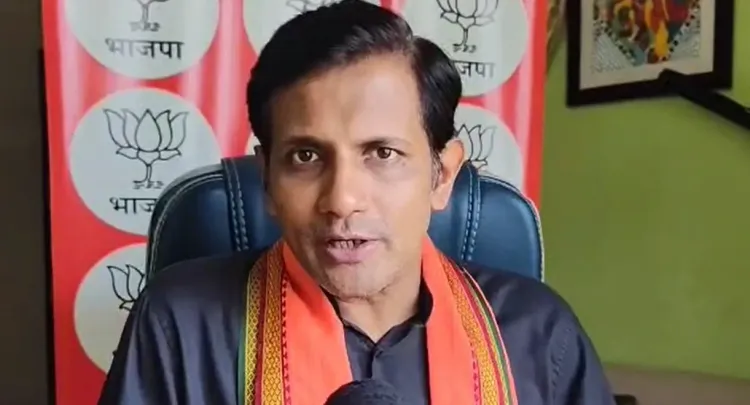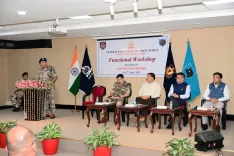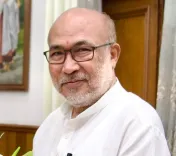Should Congress Apologise to the Nation for the 42nd Amendment of the Constitution?

Synopsis
Key Takeaways
- The 42nd Amendment is often referred to as the 'mini-Constitution.'
- It introduced the terms 'socialism' and 'secularism' into the Preamble.
- Provisions placed laws beyond judicial review during the Emergency.
- Indira Gandhi's government faced significant criticism for its actions during this period.
- BJP calls for Congress to acknowledge its historical mistakes.
New Delhi, June 28 (NationPress) BJP National Spokesperson Tuhin Sinha delivered a pointed critique of the Congress on Saturday, insisting that the party must apologise to the nation for the 42nd Amendment of the Constitution, which he referred to as the “most alarming” and detrimental amendment in the annals of India's constitutional framework.
His comments were a direct response to Congress general secretary in charge of communications, Jairam Ramesh, who accused the RSS on Friday of having “never accepted” the Constitution. The Congress party claimed via a post on X from its official handle that the ideology of the RSS-BJP is fundamentally “anti-constitutional.”
“Recently, RSS general secretary Dattatreya Hosabale called for alterations to the Preamble of the Constitution, suggesting the removal of the terms 'socialist' and 'secular.' This represents a conspiracy to undermine Baba Saheb’s Constitution, a plan that the RSS-BJP has perpetually pursued,” the Congress statement asserted.
In his response, Tuhin Sinha remarked to IANS, “The manner in which Congress is targeting the BJP while levying baseless accusations that we have eroded the foundations of democracy is utterly ridiculous. It’s akin to a thief admonishing a police officer. This mirrors Congress's current stance.”
Sinha reminded the public that it was during former Prime Minister Indira Gandhi’s regime that the nation witnessed one of the darkest times for constitutional principles during the Emergency of 1975, which he contended led to a series of deeply troubling constitutional amendments.
“When former PM Indira Gandhi declared the Emergency in 1975, it ushered in five egregious constitutional amendments. The 38th Constitutional Amendment was enacted in August 1975, making it impossible to challenge the Emergency in a court of law. The 39th Amendment prohibited the election of the Prime Minister from being contested. The Times of India headline from December 1975 showcased Indira Gandhi’s open declaration of her intention to introduce even more significant changes to the Constitution,” he elaborated.
He further accused the Congress of consistently harboring an “anti-constitutional” stance despite its assertions.
“One can observe how Congress has consistently opposed constitutional values. Just a year after Indira Gandhi’s declaration in December 1975, the 42nd Constitutional Amendment was introduced in December 1976. This amendment is commonly known as the ‘mini-Constitution’ due to the extensive changes it implemented. The terms ‘socialism’ and ‘secularism’ were incorporated into the Preamble. More troubling was the clause that ensured any legislation passed by Parliament could not be subjected to judicial review. Courts were rendered powerless to challenge such laws. This was a calculated and systematic assault on our Constitution that transpired from August 1975 to December 1976. Given this background, I doubt Congress possesses any moral authority to criticise us today,” Sinha stated to IANS.
The BJP spokesperson contended that Congress continues to deny its errors from the Emergency period and remains unapologetic.
“Even now, the Congress party shows no remorse for those actions. It has never offered an apology. It is crucial for people to recognize that when our Constitution was adopted in 1950, the terms ‘secular’ and ‘socialist’ were intentionally omitted from the Preamble. Why? Because our founding father, BR Ambedkar, who presided over the drafting committee, was a visionary. He comprehended that Articles 25 to 28 of the Constitution already ensured secularism. Likewise, Articles 38 and 39 safeguarded the principles of socialism. This is why these terms were not deemed essential in the Preamble initially,” he clarified.
Sinha concluded by reiterating his demand for a formal apology.
“The manner in which these two terms were inserted during the Emergency was a misfortune for this nation. Even now, Congress needs to extend an apology to the country for the 42nd Constitutional Amendment,” he remarked.







